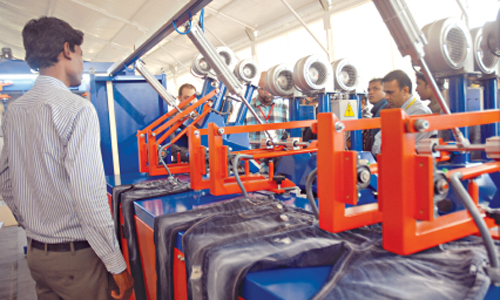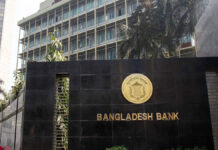Bangladesh Bank has tightened the rules for import of capital machinery in a bid to tackle money laundering as the clients are now attaching only one Harmonised System code of particular capital machinery with their import form.
The BB issued a circular to all banks in this regard on July 9 saying the clients would have to attach all HS codes of the capital machinery with their IMP forms from October 1, 2015.
The Harmonised System is an internationally standardised method of names and numbers to classify the traded products. It came into effect in 1988 and has since been developed and maintained by the World Customs Organisation, a BB official told New Age on Thursday.
He said that the country’s banking sector had recently faced widespread criticism from different corners that the businesspeople laundered money abroad by manipulating the over-invoicing of the import of capital machinery.
Due to the new rules, the banking sector will be able to tackle the money laundering through the import of capital machinery, he said.
The BB also relaxed the export- and import-related process for the commercial banks and clients through issuing the circular so that they (clients and banks) can easily settle and opening the letters of credit related procedures.
The clients will have to submit two copies of export forms to authorised dealer branches instead of the existing four copies.
The clients will also have to submit one copy of letter of credit authorisation form and import form instead of existing five copies and two copies respectively.
The clients will not require submitting travel and miscellaneous forms separately as the central bank has taken initiative to incorporate the TM form with the IMP form.
The banks now have to preserve the IMP, EXP and TM forms for life time, but they will be allowed to demolish the forms after five years in line with the new central bank directives.
The banks are now colleting four sets of EXP forms from their clients of which one set is sent to the customs office. The customs office later sends the set to the central bank.
Of the remaining three sets of EXP form, the banks send one set to the central bank after completing the shipment of the exported products and another set was sent after realising the export proceeds. The banks preserve the last set of the EXP form in their own custody.
According to the new rules, the banks will have to collect two sets of EXP forms of which one set will be sent to the customs office and it (customs office) will later send the copy to the central bank. Another set of the EXP form will be preserved by the banks for five years.
The banks, however, will not send any IMP and LCAF form to the central bank as they now have to submit the import-related data through the BB’s dashboard, the central bank circular said.
The BB issued a circular to all banks in this regard on July 9 saying the clients would have to attach all HS codes of the capital machinery with their IMP forms from October 1, 2015.
The Harmonised System is an internationally standardised method of names and numbers to classify the traded products. It came into effect in 1988 and has since been developed and maintained by the World Customs Organisation, a BB official told New Age on Thursday.
He said that the country’s banking sector had recently faced widespread criticism from different corners that the businesspeople laundered money abroad by manipulating the over-invoicing of the import of capital machinery.
Due to the new rules, the banking sector will be able to tackle the money laundering through the import of capital machinery, he said.
The BB also relaxed the export- and import-related process for the commercial banks and clients through issuing the circular so that they (clients and banks) can easily settle and opening the letters of credit related procedures.
The clients will have to submit two copies of export forms to authorised dealer branches instead of the existing four copies.
The clients will also have to submit one copy of letter of credit authorisation form and import form instead of existing five copies and two copies respectively.
The clients will not require submitting travel and miscellaneous forms separately as the central bank has taken initiative to incorporate the TM form with the IMP form.
The banks now have to preserve the IMP, EXP and TM forms for life time, but they will be allowed to demolish the forms after five years in line with the new central bank directives.
The banks are now colleting four sets of EXP forms from their clients of which one set is sent to the customs office. The customs office later sends the set to the central bank.
Of the remaining three sets of EXP form, the banks send one set to the central bank after completing the shipment of the exported products and another set was sent after realising the export proceeds. The banks preserve the last set of the EXP form in their own custody.
According to the new rules, the banks will have to collect two sets of EXP forms of which one set will be sent to the customs office and it (customs office) will later send the copy to the central bank. Another set of the EXP form will be preserved by the banks for five years.
The banks, however, will not send any IMP and LCAF form to the central bank as they now have to submit the import-related data through the BB’s dashboard, the central bank circular said.
Source: n










